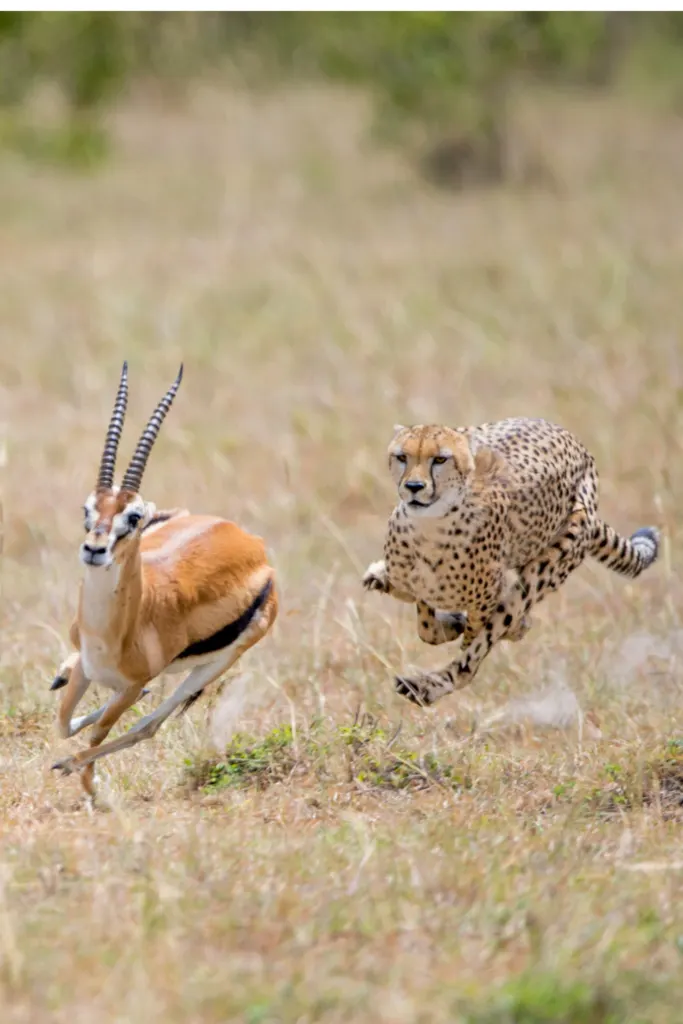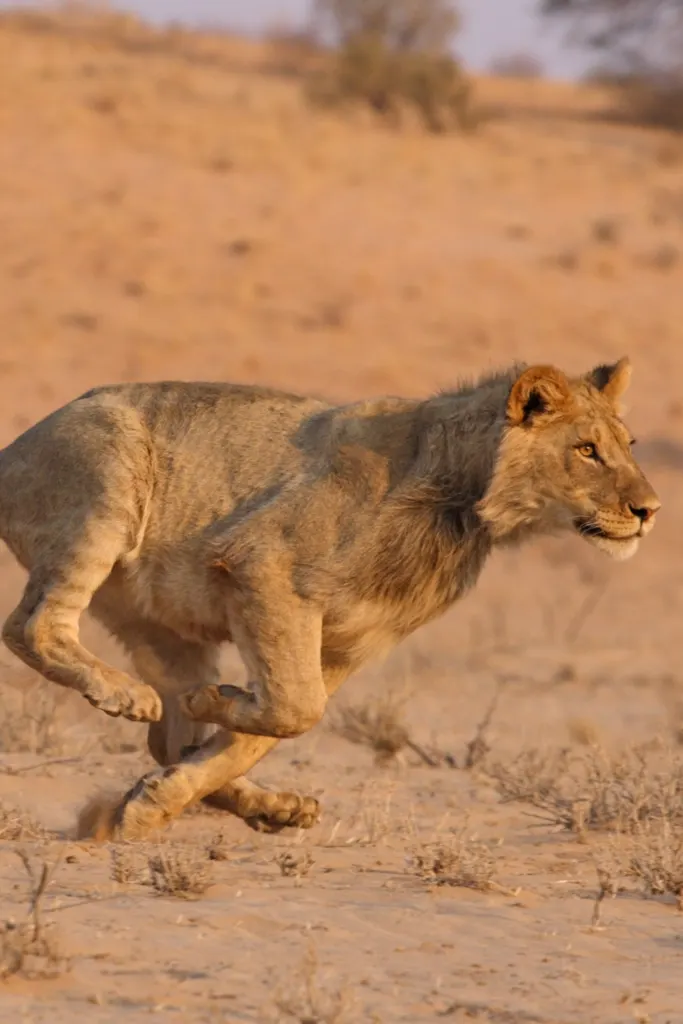The running speeds of humans and animals have long been a fascinating topic for many.
Animals like the cheetah can achieve remarkable speeds in a matter of seconds, matching some of the world’s most powerful sports cars.
You may be wondering: “How fast can a cheetah run?”
There are several factors which affect running speeds of humans and animals, namely biomechanics.
The world’s fastest human sprinter wouldn’t be able to beat an ordinary animal like the warthog, let alone an animal like the cheetah.
So how fast can a cheetah run? And what other land animals are in the top 10?
In this guide we’ll explore:
- How fast can a cheetah run?
- How fast can a human run?
- Human vs animal speed
- Why do cheetahs run so fast?
- Where is the fastest cheetah on Earth?
- 11 fastest land animals on Earth ranked
- 11 fastest animals on Earth ranked
- 6 tips to improve your running speed
Ready?
Let’s go!

How fast can a cheetah run?
Cheetahs are the world’s fastest land animal, capable of speeds of up to 75mph or 120kmph.
They can reach the top speed of 75mph in a matter of seconds with high acceleration, which matches some of the world’s most powerful sports cars.
With long and graceful legs, cheetahs are built for speed and hunting on the open plains in Africa.
Unlike other big cats, cheetahs prefer to hunt during the day, especially in the early morning or early evening.
This does make them susceptible to predators like hyenas and lions, particularly young cheetah cubs.
Related: How to use Jeff Galloway’s magic mile running test
How fast can a human run?
In contrast, a human can run up to speeds of up to 27mph.
This top speed was reached briefly by Jamaican sprinter Usain Bolt in the 100m race in the World Championships in 2009.
Bolt finished with a world record time of 9.58 seconds and still holds the world record today.
In 2018, American athlete Christian Coleman broke a world record for the 60m sprint, finishing it in 6.37 seconds. Some argue that Coleman now holds the title of the fastest man alive.
The fastest female athlete accolade goes to Florence Griffiths-Joyner who holds the fastest 100m world record at 10.49 seconds.
Related: How long does it take to run a mile?

Human vs animal speed
Now you know the top speed of the fastest animal and the fastest human, see how they compare to other land animals.
The average speeds for humans in the table below are based on runners aged between 20-40 and calculated using the average running speed per mile in a 5k.
| Human/animal | Running speed (mph) |
| Fastest man | 27 |
| Fastest woman | 21 |
| Average man | 5.9 |
| Average woman | 5 |
| Cheetah | 75 |
| Proghorn Antelope | 55 |
| Springbok | 55 |
| Quarter Horse | 54.7 |
| Blue Wildebeest | 50 |
Why do cheetahs run so fast?
With its small head, flattened rib cage and long, lean legs, the cheetah is made for speed with its aerodynamic features.
The cheetah has an unusually flexible spine which, along with its hips and shoulder blades, make the animal’s skeleton a springboard for kinetic energy and speed.
They also have a lightweight body, which helps them gain fast speeds more quickly.
Related: What is a good 5k time? Average 5k time by age and gender
Where is the fastest cheetah on Earth
A female cheetah called Sarah at Cincinnati Zoo in Ohio, USA holds the world record as the fastest land animal on Earth.
Sarah was formerly a South African cheetah and came to the Cincinnati Zoo when she was six months old.
She ran 100 metres in a mind-boggling 5.95 seconds which equates to 61mph. This far surpasses the world record time held by Usain Bolt which is 9.58 seconds.
It is thought that cheetahs in the wild – when hunting down prey – run considerably faster.
Unfortunately, Sarah passed away in 2016 at the age of 15.
Related: What is a good 10k time? Average 10k times by age and gender

11 fastest land animals on Earth ranked
Now you know all about how fast a cheetah can run, here are the top 11 fastest land animals on Earth ranked.
- Cheetah (75mph / 120kmph)
- Pronghorn Antelope (55mph / 88kmph)
- Springbok (55mph / 88kmph)
- Quarter Horse (54.7mph / 88kmph)
- Blue Wildebeest (50mph / 80.5kmph)
- Lion (50mph / 80.5kmph)
- Blackbuck (50mph / 80kmph)
- Hare (50mph / 90kmph)
- Greyhound (46mph / 74kmph)
- Kangaroo (44mph / 71kmph)
- African Wild Dog (44mph / 71kmph)
Related: Running 5 miles a day: Pros and cons
11 fastest animals on Earth ranked
Contrary to popular belief, some of the world’s fastest animals are not land animals at all.
Birds like the Peregrine Falcon and Golden Eagle can reach speeds of up to between 200 to 242mph.
Compared with these majestic birds, cheetahs come up sixth on the list of the world’s fastest animals.
Fish like the Marlin Fish and Sailfish also make this list, with diving speeds of up to between 50 to 68mph.
- Peregrine Falcon (242mph / 389kmph)
- Golden Eagle (200mph / 321kmph)
- Spine-tailed Swift (106mph / 170kmph)
- Frigate Bird (95mph / 152kmph)
- Spur-winged Goose (88mph / 141kmph)
- Cheetah (75mph / 120kmph)
- Sailfish (68mph / 109kmph)
- Pronghorn antelope (55mph / 88kmph)
- Springbok (55mph / 88kmph)
- Quarter Horse (54.7mph / 88kmph)
- Marlin Fish (50mph / 80kmph)
Related: How to run faster for longer without getting so tired

6 tips to improve your running speed
There are many ways you can run faster to achieve your next PB.
Unfortunately as humans we cannot miraculously grow two additional legs, so in the meantime we have to focus on those elements that are in our control to improve running speed.
Here are 6 tips to improve your speed:
#1 Maintain a healthy weight
Your body weight will influence how fast you can run. The more you weigh, the more energy it will take to propel your body forward.
Gravity works against you when you run. Every time you lift your foot off the ground, the gravitational forces work to push it back down.
The more weight your legs are carrying, the more difficult this process becomes.
So the key is to maintain a healthy weight if your goal is to run faster.
Your VO2 Max (the amount of oxygen your body is able to utilise during exercise) will also be impacted by the amount of weight that you’re carrying.
#2 Check your running gear
What you wear on a run can affect how fast you are able to run.
Consider investing in lightweight gear like lightweight clothing and running shoes for optimum running performance.
Fabrics like nylon, polyester and bamboo are sweat-wicking and will keep your body dry and cool.
#3 Speed train
Speed is an essential component of any training plan when wanting to run faster.
Workouts like interval training, tempo running, strides and Fartlek training all help to build your speed and endurance as a runner.
Aim to include at least 1-2 speed training sessions in your training plan each week to really reap the benefits.
#4 Strength train
Strength training (also known as resistance training) is recommended for any runner looking to run faster for longer.
A strong body makes it easier to run consistently using proper running form and improve speed and endurance.
Aim to include at least 1-2 strength training sessions in your training routine each week.
Each strength session should last no longer than 45 minutes and should follow an easy run or be done as a standalone session.
Bodyweight exercises such as squats and lunges are great for beginners.
You can then look to include weighted exercises such as deadlifts and weighted squats when you have become familiar with the basics.
#5 Allow for rest days and recovery
Rest days are essential to any training plan to allow your body to recover in between runs.
You should aim to rest fully on your recovery day, or dabble in some gentle ‘active recovery’ exercises like walking and cycling.
#6 Stay healthy
Following a healthy diet gives you a better chance of maintaining and improving your fitness levels.
Aim to eat a balanced diet of carbohydrates, protein and healthy fats, as well as vitamins and minerals.
You’ll also want to ensure you stay hydrated – drinking plenty of water. Herbal teas and coconut water are also great options.
- 5 things I wish I’d known before returning to running - March 3, 2024
- Running 20 minutes a day: Benefits + how to start - January 27, 2024
- How to run your first 2 hour half marathon - January 16, 2024
